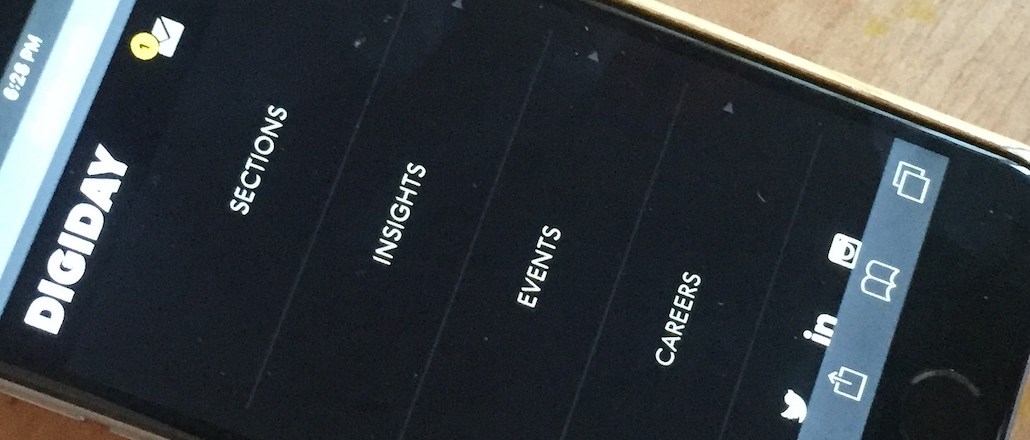Last chance to save on Digiday Publishing Summit passes is February 9
ICYMI: Platform reality checks and the best of Digiday from the week that was

Welcome to ICYMI. Every week, our writers work to bring you the most insightful reporting in digital media and marketing. We realize that you have jobs, though, and it’s impossible to read it all. We forgive you. This is a safe place.
In this new weekly post (and email), Digiday’s editors hand pick the best stories of the week. These aren’t necessarily the pieces that drew the most eyeballs, though. These are the cream of the Digiday crop, our most relevant, revealing, interesting, strange or funny stories of the week. We work hard to make our stories both timely and timeless, no easy feat given the breakneck pace of evolution in our industry. That said, if you missed a post a few days ago, it’s still new to you.
Here’s a look at what you may have missed in the week that just ended:
- Sahil Patel, our digital video reporter, had a big reality check for publishers this week: Video may be sexy and lucrative but it’s hard to do. And, most importantly, extremely hard to scale and highly unlikely to be much of a lifeline for VC-addled publishers desperate for growth areas. Sometimes the conventional wisdom doesn’t hold water upon closer inspection.
- So what’s a media company to do? Many are trying their hands at selling stuff. Lucia Moses reports that as online advertising comes under pressure from all sides, publishers are increasingly looking to commerce to bolster revenue. That’s given rise to a new class of employee: The e-commerce editor. From Gawker to Business Insider to BuzzFeed to Vox, publishers are pushing products along with their editorial.
In a lighter note, here’s our favorite tweet from Finland this week, linking to a Mark Duffy rant against the linguistic assault on advertising:
Nyökyttelen, koska olen ankanselkäöljyllä valeltu bränditarinankertoja. Tämä juttu koskee kaikkia muita kuin minua. https://t.co/4HBPds6As2
— Jukka Ahola (@JukkaAhola) April 15, 2016
- Speaking of our favorite things from Europe, in this week’s Digiday Podcast, The Economist’s Paul Rossi held court on the need for balanced revenue models for media. In this clip from his conversation with Digiday editor-in-chief Brian Morrissey, Rossi explained what keeps him up at night.
“We’re seeing a rebellion against advertising. The ad blocking phenomenon is a real one. I think it’s going to do nothing but continue. There’s lots of kids out there who are learning to skip before they’re learning to walk. They’re skipping ads on iPads and they’re not in any way engaging with advertising because of the technology.”
- Meanwhile, it’s lonely out there for men in PR. Yuyu Chen went deep this week with an exploration of what it feels like to be one of the media industry’s rarest minorities. One senior exec we spoke with who has been in the industry for more than 15 years recounts being excluded from all-female happy hours. One PR firm didn’t even have a men’s room. Cry these blokes a river, though: For an industry where being a man puts you in the minority, there’s no shortage of them in top ranks. Funny how that works. On Twitter, the piece proved divisive, although most critics were vague about why exactly they objected.
you’ve gotta be kidding me. delete this. https://t.co/u04lSBDGU8
— drew olanoff (@drew) April 15, 2016
- Finally, don’t mess with redheads. It’s a lesson Match.com learned the hard way when they were shamed into pulling down billboards in the London tube. As part of their #LoveYourImperfections campaign, the dating site posted a series of billboards that included a close-up of of a woman’s freckled face along with the copy “If you don’t like your imperfections, someone else will.” Commuter complaints were lodged with the Advertising Standards Authority, and spread widely on social media. Match has apologized. But hey, love your imperfections, guys.
More in Media

Brands invest in creators for reach as celebs fill the Big Game spots
The Super Bowl is no longer just about day-of posts or prime-time commercials, but the expanding creator ecosystem surrounding it.

WTF is the IAB’s AI Accountability for Publishers Act (and what happens next)?
The IAB introduced a draft bill to make AI companies pay for scraping publishers’ content. Here’s how it’ll differ from copyright law, and what comes next.

Media Briefing: A solid Q4 gives publishers breathing room as they build revenue beyond search
Q4 gave publishers a win — but as ad dollars return, AI-driven discovery shifts mean growth in 2026 will hinge on relevance, not reach.





